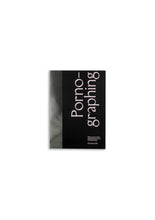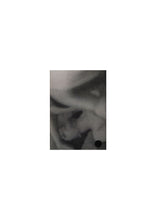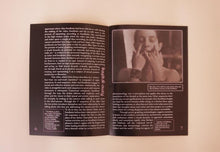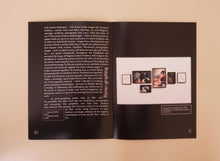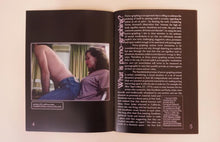Porno-graphing - what do ’dirty’ subjectivities do to art?
AnnaMaria Pinaka
Regular price
$15.00
Sale
In her research, Pinaka uses the term porno-graphing to group together and examine lens-based artworks where artists use material sexual situations or sets of sexual dynamics present in their lives and independent of their practices, to make art. Pinaka considers how artists act upon these sexual situations, the art-results they produce, and their means of sharing them with an audience. These situations and dynamics share commonalities as they can be regarded as ‘taboo’ or ‘transgressive’; also, in that artists use them to underline the ‘dirtiness’ or ‘wrongness’ of their sexual and artistic subjectivities. For example, Kathy Acker with Alan Sondheim, after recognising the sexual dynamic between them as work-material, they act upon it to make art (instead of treating it as private enjoyment) and to do so they self-objectify into certain roles. In the Blue Tape, discussions of art, romantic love and phenomenology are talked-through video sequences of sexual stimulation and negation as a way of deliberating and reorganizing meaning and value.
Pinaka argues that in porno-graphing, artists negotiate how subjectivity, and its value, is produced by self-submitting into the ‘dirtiness’ of sexual and artistic positions. To approach the ‘dirtiness’ of these works as well as their processes, Pinaka uses, amongst other theories and strategies, the notion of ‘queer negativity’.
AnnaMaria Pinaka was educated as a video artist, and developed her thesis in the department of Theatre, Drama and Performance at Roehampton University. Her research is practice-based; it involves creative work in performance and image-making alongside theoretical reflection derived from gender studies, queer theory and visual studies. Broadly speaking, Pinaka’s focus is sexualised representation, and the development of a visual language that borrows in part from the rhetorics of pornography, but which also relates to the visual arts that focus on the intimacy of private life, the lived ordinary, the ecstasies of the everyday, lack of spectacularisation and the aesthetics of banality.
- Type: softcover
- Dimensions: 148 x 210 MM / 5.8 x 8.3 inch
- Pages: 40
- ISBN: 978-94-91677-8-16
- Editor: Pernilla Ellens, AnnaMaria Pinaka
- Author: AnnaMaria Pinaka
- Graphic: Mook Attanath






